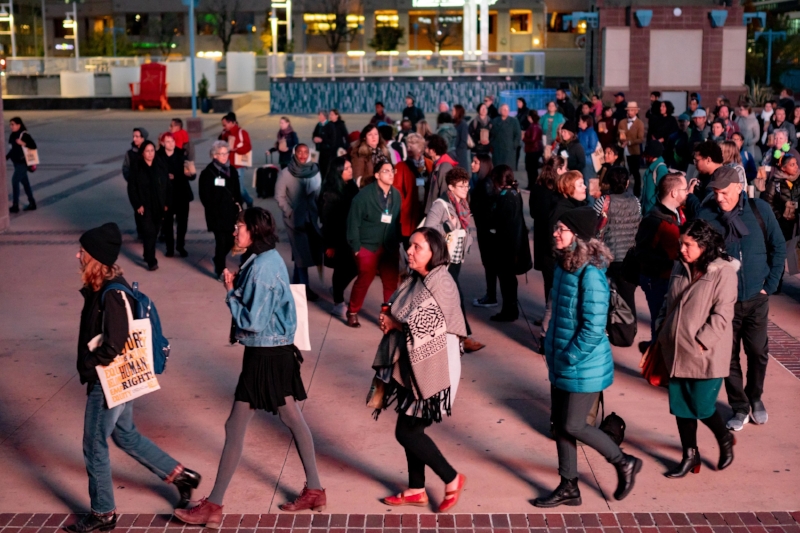At the USDAC National Cabinet meeting that preceded CULTURE/SHIFT 2018 (the people-powered department’s second national convening), a Cabinet member remarked that we have uncanny timing. The prior CULTURE/SHIFT took place just ten days following the 2016 Presidential election; and though few of us foresaw the outcome, all were grateful to be welcomed into a supportive community of people from many places who shared a commitment to culture as a path to equity, justice, and love. This time, when we gathered on November 1st in Albuquerque for CULTURE/SHIFT 2018, another election was just a few days away, and in a moment marked by intense organizing and mingled hope and fear, the mood of the body politic was divided.
On opening night, we stood together in the chill air of Albuquerque’s Civic Plaza to witness a beautiful acknowledgement of ancestors offered in song and blessing by Kansas Begaye (Diné) and Nicolle Gonzalez (Diné), to hear welcomes from the City’s Mayor Tim Keller and Hakim Bellamy, Deputy Director of the Cultural Services Department, CULTURE/SHIFT’s host partner. USDAC Minister of Activation and Collaboration and an Albuquerque native, Gabrielle Uballez, reminded the hundreds assembled there that
We are people who place our gifts at the service of community, equity, and social change.
We are more powerful than we think.
We are change.
And at a time marked by voter suppression, troops massing along the border, and violence directed at so many communities, Gabrielle said,
This weekend, as CULTURE/SHIFT-ers and USDAC Citizen Artists, we are that diverse, inclusive, beautiful group of people who is figuring out how we use our gifts in creativity, arts and culture to live together.
I invite you to take this energy and vision we collectively create this weekend back home with you into your homes, schools, neighborhoods, cities, states, and regions so we can show up as our whole selves to make U.S. who we really are and who we really want to be. Welcome! Welcome! Welcome!
Once again, we’d been welcomed into a true community, and the mood shifted. A path opened at our feet, marked by farolitos (sometimes called luminarias), small candles protected from the wind by paper bags. Carrying them, we wound our way into the convention center for a performance especially created for the occasion by The EKCO POETS— Maiyah King, Valerie Martinez, Michelle Otero, and Mónica Sánchez. And CULTURE/SHIFT 2018 had begun!
Participants process from Civic Plaza to the Convention Center for the welcome ceremony
It was a full and rich three days, sold out with nearly 400 participants from the Southwest and around the U.S. taking part in more than 50 workshops, two plenaries, opening and closing ceremonies, and a culminating dance party. You can find a list of all the sessions here. Many of them were recorded on audio or video: scroll down on this page for a complete list. The Facebook album can be found here and there’s a great selection of photos on our website here.
CULTURE/SHIFT 2018 was infused with ancestral invocation and healing, participatory song, pop-up play, tools for making change on a neighborhood, city, and state-wide level, policy deep dives, movement and embodiment, calls to action, delicious food, cultural strategy, radical imagination, deep connection and listening, and raw honesty about both the grief and fear and the hope and possibility of these times.
With so much to choose from, it’s hard to know what could capture the spirit of CULTURE/SHIFT for those unable to attend, other than to say it was all ages, cultures, faiths, genders, abilities, all learning, all belonging, all engaging, all the time.
“This Moment: A Community Plenary,” the opening session on Friday morning, November 2nd, expressed it well.
You can watch the entire plenary on Facebook video here. After an acknowledgment of Tewa lands by Daryl Lucero of Isleta Pueblo and welcomes by Shelle Sanchez, Director of Albuquerque’s Department of Cultural Services and by USDAC Chief Instigator Adam Horowitz, one by one, six powerful Citizen Artists offered us five minutes each of deep sharing, and in between each pair of offerings, we turned to our neighbors to share our responses.
Frederick “Wood” Delahoussaye, Artistic Director of Ashé Cultural Arts Center in New Orleans, welcomed us home with a powerful short video originally created for New Orleans homecoming after Katrina, now replayed every August 29th. Then Wood spoke to us of an idea of home that encompasses everyone. “This weekend,” Wood said, “I want to offer you a chance to come home….Who you love, how you love, if you’re done with love, consider this space to come home. Take a moment, turn to your neighbor, and say ‘Welcome home.’” He was followed by Candace Kita, Cultural Work Manager of the Portland, Oregon-based Asian Pacific American Network of Oregon, welcoming us to bring all we are by sharing one of her own loves that isn’t always welcome wherever she goes: astrology. “I wanted to talk about astrology as an unconventional medium that moves us toward a lot of the same goals we have for cultural work: building connection, creating new narratives for understanding ourselves and the world, and healing in this divisive political moment.”
After an interlude of dialogue in pairs, Daniel Banks, Catalytic Agent on the USDAC National Cabinet and Co-Director of DNAWORKS, led us in breathing together and spoke about how so much that is being validated by science reinforces what many artists working in community know about the workings of our brains and breath to create connection, nourish creativity, generate empathy, and hold space for healing. “Breathing allows us to learn new things. In theater, our breathing is synchronized. Theater creates spaces of heightened understanding …[s]cientifically speaking, theater heals people and saves lives.”
After another dialogue interlude, Lulani Arquette, Catalyst for Native Creative Potential on the USDAC National Cabinet and CEO of the Native Arts and Cultures Foundation, shared that her ancestors were kahuna kalaiwa'a (master canoe carvers) and her great-uncles paddled with Olympic champion Duke Kahanamoku. Providing context for “I Ku Mau Mau,” a powerful Native Hawaiian chant she taught, she explained that it embodies the values of persistence and community embedded in the communal search for the right tree and the massive participatory process of bringing it home and turning it into a canoe.
Tannia Esparza, Executive Director of the Albuquerque-based Young Women United, “a reproductive justice coalition led by and for women of color,” came next, sharing her experience in organizing successful community-wide rejection of a ballot measure that would have eliminated abortion care. “We took it out of the polarizing narrative of pro-life and pro-choice, and flipped the script…to make it about people’s decisions, whether or not we agreed with abortion access itself.”
The topic for our third dialogue looked to the future: What seeds are you planting now that you hope to see grow and nourish future generations? Many people rose from the audience to share what they had heard, said, and felt. Visual artist Beverly Naidus, Associate Professor of Interdisciplinary Arts, University of Washington – Tacoma, said, “It’s extraordinary to feel that you’re part of a national, maybe international group of insiders, rather than being an outsider, and to feel that you are resonating with the room in so many different ways. I thank you all for being here. I have so much gratitude.”
Charon Hribar of the Poor People’s Campaign leads the closing song of “This Moment: A Community Plenary”
Chief Instigator Adam Horowitz offered a closing that ended this way: “May we continue conjuring futures different from the ones the powers-that-be would have us believe are the only ones possible. And may we vote on Tuesday!”
This plenary ended with a rousing song led by Charon Hribar, Co-Director of Cultural Arts for the Poor People’s Campaign: A National Call for Moral Revival, who was joined onstage by a group of Citizen Artists who’d taken part in the previous evening’s “Happiest Hour of People’s Songs,” co-led by Charon and Santa Fe artist Alysha Shaw. Charon taught a new call-and response song written at a Poor People’s Campaign gathering by Minnesotan Ruth MacKenzie. Here are the first and last verses of “Goin’ On”:
There’s a racial justice movement goin’ on, goin’ on
Put your ear to the ground, feel the power movin’ around
There’s a racial justice movement goin’ on
There’s a cultural revolution goin’ on, goin’ on
Put your ear to the ground, feel the power movin’ around
There’s a cultural revolution goin’ on, goin’ on
Our gratitude to all who planned, prepared, presented, brought their hearts, souls, and minds to the convening, and together, welcomed each other home to CULTURE/SHIFT 2018! May all that you gave be returned to you a hundredfold!


